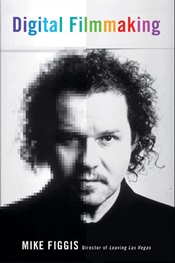(Faber & Faber, 176 pages, $13)
By Mike Figgis
 As a trained jazz musician and a veteran of live theater, Mike Figgis’ filmmaking career (Leaving Las Vegas, Stormy Monday) has been defined by a jazzman’s adaptability and a theatrical sense of spontaneity. In fact, when he became a professional filmmaker, his desire for immediacy of expression and greater technical simplicity was often frustrated by the unwieldiness of the cinematic production model. Only now, in the era of user-friendly digital equipment, has he found a working method that clears away all the logistical and technological baggage he felt intruding between the filmmaking and his audience.
As a trained jazz musician and a veteran of live theater, Mike Figgis’ filmmaking career (Leaving Las Vegas, Stormy Monday) has been defined by a jazzman’s adaptability and a theatrical sense of spontaneity. In fact, when he became a professional filmmaker, his desire for immediacy of expression and greater technical simplicity was often frustrated by the unwieldiness of the cinematic production model. Only now, in the era of user-friendly digital equipment, has he found a working method that clears away all the logistical and technological baggage he felt intruding between the filmmaking and his audience.
Figgis’ short volume on the perils and delights of digital filmmaking notes that there exists now the means for a near-revolution in the way films are made—if only the moneymen and the studio bigwigs could see it. He discerns a bloated, prohibitively expensive orchestral model of filmmaking that still holds sway, even though films can easily now be made by a crew more reminiscent of a jazz quartet. That means adapting oneself to locations (rather than vice-versa), being prepared to scrap overly ambitious approaches for cleaner and simpler ones, working with different kinds of natural or electrical light (he has lit whole scenes with Mag flashlights and cell phone displays), and being flexible and inventive in the face of sudden changes in light or location.
Whatever one makes of Figgis’ oeuvre, there is no doubt that his smaller, digital movies—Timecode and Hotel—offer as compelling a set of alternative filmmaking strategies as the work of flashier digital directors like Harmony Korine or Lars von Trier. His approach, as he outlines it here in jargon-free style, is as useful for the neophyte studying Filmmaking 101 as the experienced studio director who’d like to work in a smaller and more intimate register.
Review written by John Patterson.